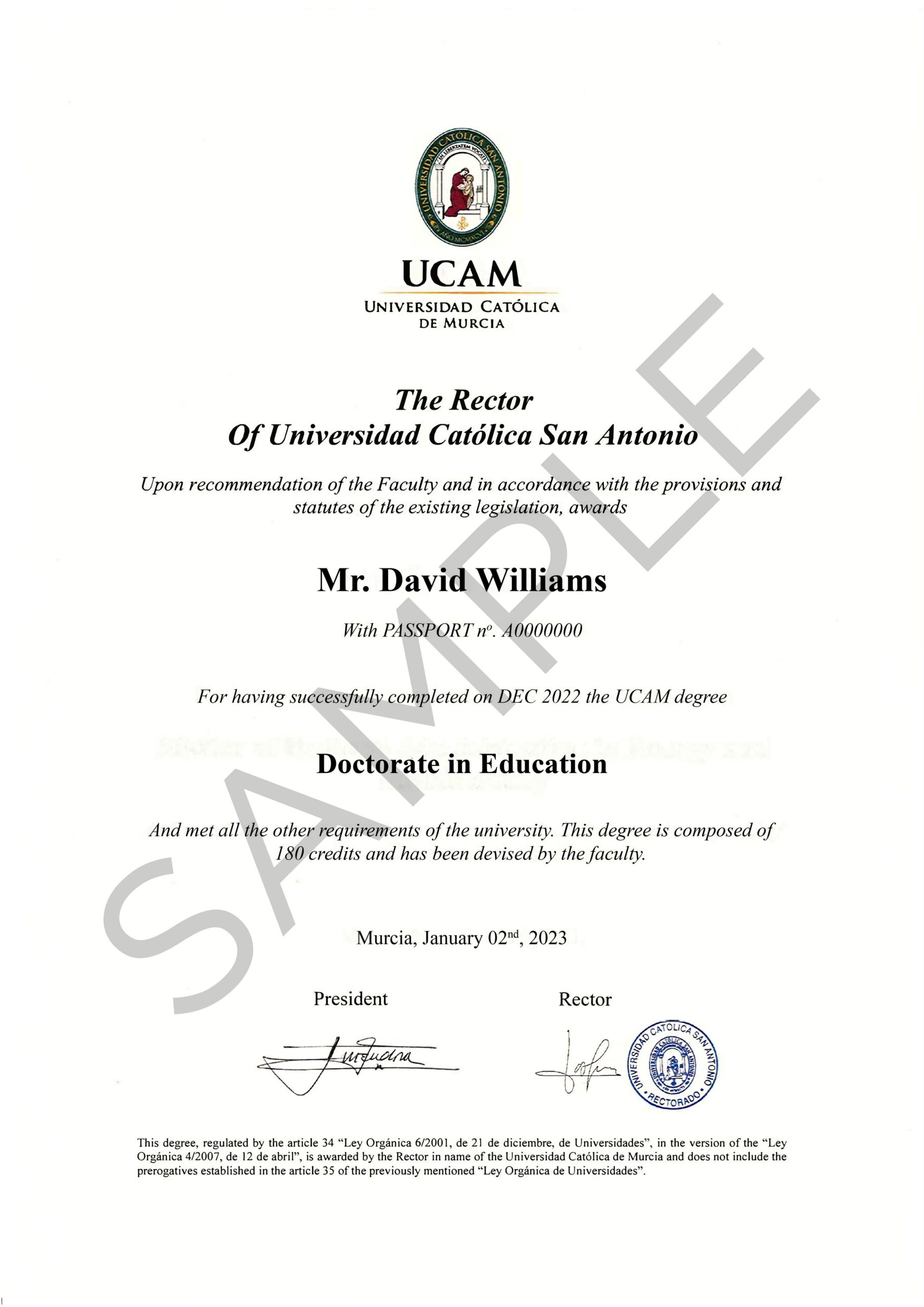The Doctorate in Education program aims to upgrade the learners’ educational management and leadership skills, turning them into highly efficient evidence-based practitioners and supporting the profession’s growth.
Doctorate in Education
Program Overview
This is a unique program which will integrate rigorous academic and critical analyses and practical relevance and application. The Doctorate in Education program is suitable for teachers as well as administrators, to develop and enhance their professional expertise and deepen their impact. It builds their expertise and confidence to become a catalyst for positive change in their institution and community at large. The course will enable students to acquire and understand a substantial body of knowledge which is at the forefront of a particular academic field or field of professional educational practices.
Students will begin to develop their abilities in conceptualizing, designing, planning, and implementing projects with the purpose of generating new knowledge and applying the new develop ideas in the field of education. Students will be led to understand how to apply research and advanced academic inquiry techniques and improve the quality of their educational profession.
This is a three-year applied Doctorate degree in education that will provide a firm foundation of the modern education system operations and prepare educators to solve pressing educational problems and improve learning outcomes in their organization and beyond.
Talk to our Experts

Modules
The course will enhance participants’ understanding of the research process. Participants will critically explore research approaches, language, and ethics. The course will take a step-by-step approach to develop students’ knowledge, skills and understanding on design and implementation of quantitative and qualitative research designs including Cross-sectional surveys, cohort studies, Randomized Controlled Trials, operational study designs which include quasi experiments and Cluster Randomized Controlled Trials. The course will equip students with the skills necessary to conduct secondary research designs including scoping and systematic reviews. The course will also help students to develop the skills to recognize and reflect on the strengths and limitations of different research methodologies and address ethical and practical issues in research. Furthermore, the student will be equipped with the ability to methodologically review and derive meaning from published research work for application in professional practice and growth.
Learning Outcomes
LO1: To identify and describe different quantitative study designs, describe the key elements and weaknesses and strengths associated with each approach, and application of quantitative research in Educational Professional Practice.
LO2: To understand Qualitative, Quantitative and Mixed Method Research approaches and their application including data collection, analysis, and reporting methods.
LO3: To understand secondary research design and application methods including Scoping and Systematic reviews approaches, and how different research designs can be combined in a mixed method study approach.
LO4: To understand the concept of research quality assurance and its application in research and ethical principles and application of validity and reliability principles in research.
The course will lead and guide students to the in-depth understanding of the essence and purpose of critical thinking, reflective and reflexive practices, ethical issues and the current theories affecting the educational system. The students will critically analyze the Contemporary Issues in the 21st century, that will help them understand the present situation and condition of Education. This course will also consider the factors that greatly influence the entire educational system; historical, languages, organizational, political, demographic, and contemporary ideologies. They will introduce to the theory and practices of Transformative Learning and critically reflect its connection to their life as educators. The students will critically scrutinize the path of the future of education and understand the theories that greatly influence the different organizations and institutions of education.
Learning Outcomes
- LO1: To illustrate critical thinking as the foundation of reflective and reflexive practices in education.
- LO2: To critically analyze and evaluate the different theories of education relating it to their personal and professional life as educators.
- LO3: To analyze and critically reflect on the implications of Transformative Learning to the Contemporary Issues in the 21st Century and the Future of Education.
The course will equip students with essential skills, strategies, and tools they need to unleash their fullest potential in leading instructional change and innovation within the organization effectively. Students will be also involved in a comparative analysis of effective instructional approaches and models in implementing innovation and leading organizational development. Students will build their knowledge and skills which will enable them to enhance their capacities in integrative thinking, personal strategies, and style of instructional leadership that they will apply to their current and future practices essential in leading organization.
Learning Outcomes
LO1: To critically analyze different characteristics, frameworks, and styles of innovation in classroom instruction.
LO2: To evaluate effective approaches, strategies and techniques for innovation and change in instruction, assessment, and evaluation
LO3: To synthesize theories, research, and practice associated with innovation in instruction.
LO4: To create a personal instructional framework to inform future practices within educational setting.
Changes in educational technology are dramatically affecting the way students learn. This module is designed for educational practitioners who want to use theory and research to improve educational environments in order to initiate and implement change by integrating the latest technologies and instructional design principles. Students will also be involved in a comparative analysis of strategic approaches and models of implementing change and leading organizational development. With a focus on e-Learning the module will further enhance students’ understanding in the K-12/higher education, by enabling them to design and develop instruction (e-learning). This module allows students to acquire knowledge and skills in the areas of instructional systems design, learning and instructional theories, and development of e-learning and interactive multimedia learning environments using various state-of-art technology-based systems/platforms. The students will develop and lead technology-supported solutions to learning challenges in the K–12/higher education.
Learning Outcomes
LO1 To critically analyze the pedagogical implications of current and emerging technology tools for enhancing learning communities.
LO2 To evaluate existing issues, trends and policies in educational technology using principles of digital and information literacy.
LO3 To evaluate various models of system change management and create innovative technological solutions to learning challenges.
LO4 To critically analyze the educational technology needs and design an intervention plan informed by ethical practices.
About UCAM
Universidad Católica de Murcia, UCAM, is one of the fastest growing universities in the European region. Based out of Murcia, Spain, with learning centres in the UAE, Indonesia and Singapore, UCAM offers more than 163 courses, including business administration, health care, computer science, sports management and engineering. The university has strategic partnership with more than 360 international universities, including Stanford University, National University of Singapore and National Technological University. UCAM is also a member of Erasmus Mundus and Universia. The UCAM E-MBA program is ranked among the top 10 in the region and the university currently has over 21000 active learners. UCAM accredits and awards MBA program in General Management, MBA in Business Analytics, MBA in Operations and Project Management, MBA in Health and Safety Leadership, MBA in Global Banking and Finance, MBA in Agile Supply Chain Management, MBA in Global Healthcare Management, MBA in Energy and Sustainability, MBA in Accounting and Finance and MBA in Marketing Management.


Assignment and Assessment
UCAM – Exeed College follows an assignment-based assessment approach, and the student needs to submit an assignment after each module.
Entry Requirements
- Candidates must have a Master’s degree in Education or equivalent from a recognised institution.
- Candidates must have at least three years of work experience in Education management experience, at an appropriately senior level.
- English level: 6.0 IELTS or equivalent.
Documents Needed
- Duly filled application form
- Academic documents
- Resume
- A copy of your passport
- A photograph
